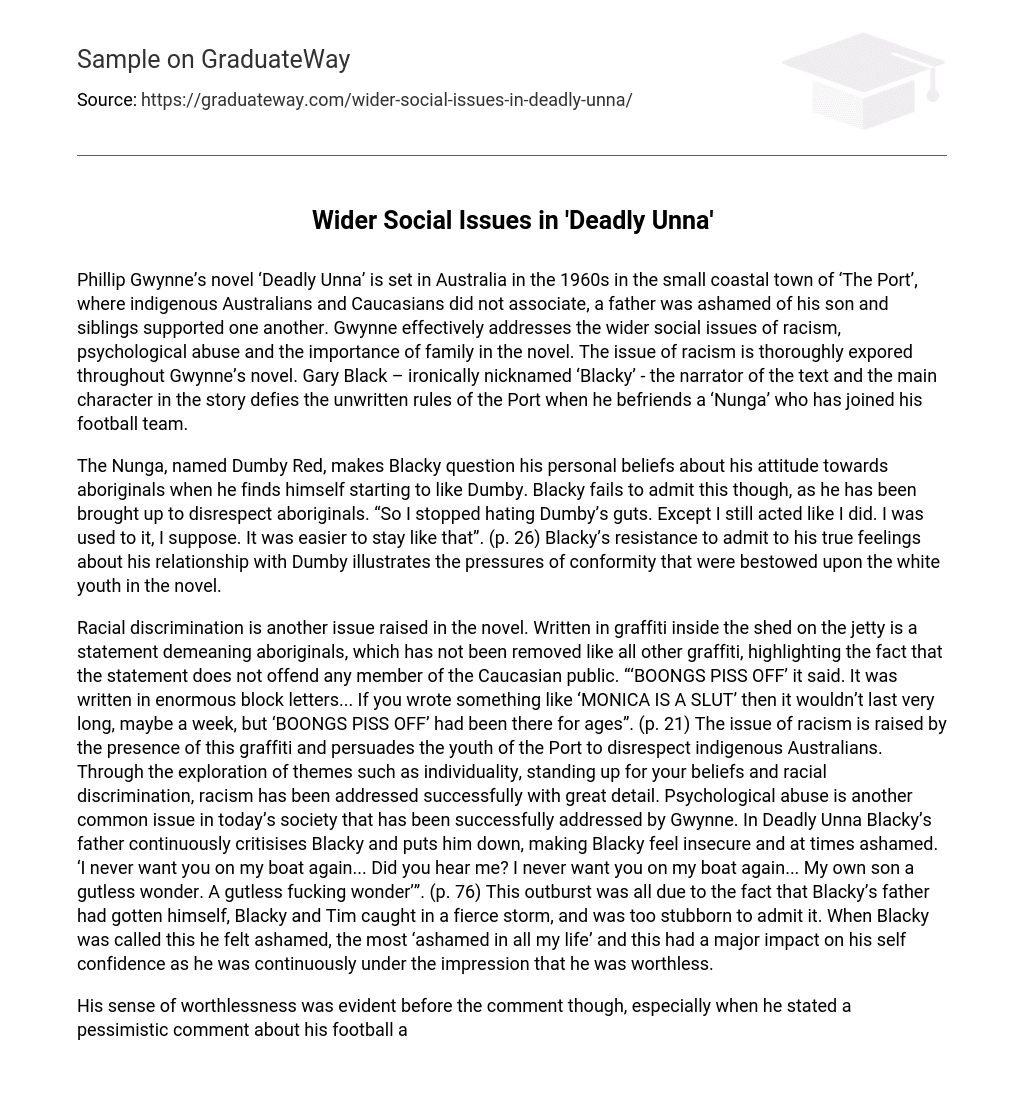Phillip Gwynne’s novel ‘Deadly Unna’ is set in Australia in the 1960s in the small coastal town of ‘The Port’, where indigenous Australians and Caucasians did not associate, a father was ashamed of his son and siblings supported one another. Gwynne effectively addresses the wider social issues of racism, psychological abuse and the importance of family in the novel. The issue of racism is thoroughly expored throughout Gwynne’s novel. Gary Black – ironically nicknamed ‘Blacky’ – the narrator of the text and the main character in the story defies the unwritten rules of the Port when he befriends a ‘Nunga’ who has joined his football team.
The Nunga, named Dumby Red, makes Blacky question his personal beliefs about his attitude towards aboriginals when he finds himself starting to like Dumby. Blacky fails to admit this though, as he has been brought up to disrespect aboriginals. “So I stopped hating Dumby’s guts. Except I still acted like I did. I was used to it, I suppose. It was easier to stay like that”. (p. 26) Blacky’s resistance to admit to his true feelings about his relationship with Dumby illustrates the pressures of conformity that were bestowed upon the white youth in the novel.
Racial discrimination is another issue raised in the novel. Written in graffiti inside the shed on the jetty is a statement demeaning aboriginals, which has not been removed like all other graffiti, highlighting the fact that the statement does not offend any member of the Caucasian public. “‘BOONGS PISS OFF’ it said. It was written in enormous block letters… If you wrote something like ‘MONICA IS A SLUT’ then it wouldn’t last very long, maybe a week, but ‘BOONGS PISS OFF’ had been there for ages”. (p. 21) The issue of racism is raised by the presence of this graffiti and persuades the youth of the Port to disrespect indigenous Australians. Through the exploration of themes such as individuality, standing up for your beliefs and racial discrimination, racism has been addressed successfully with great detail. Psychological abuse is another common issue in today’s society that has been successfully addressed by Gwynne. In Deadly Unna Blacky’s father continuously critisises Blacky and puts him down, making Blacky feel insecure and at times ashamed. ‘I never want you on my boat again… Did you hear me? I never want you on my boat again… My own son a gutless wonder. A gutless fucking wonder’”. (p. 76) This outburst was all due to the fact that Blacky’s father had gotten himself, Blacky and Tim caught in a fierce storm, and was too stubborn to admit it. When Blacky was called this he felt ashamed, the most ‘ashamed in all my life’ and this had a major impact on his self confidence as he was continuously under the impression that he was worthless.
His sense of worthlessness was evident before the comment though, especially when he stated a pessimistic comment about his football ability, “I was the worst kick in our side, probably on the whole peninsula”. (p. 16) The negative remark reflects the lack of confidence Blacky has, which demonstrates that the numerous comments made by his father have had a critical effect on his self esteem. Psychological Abuse on any child is an intimidating experience and Gwynne has depicted the incidents in a meticulous manner by incorporating numerous realistic situations so that readers can feel Blacky’s pain and anguish.
One of the most important factors in a family’s relationship is the support that they provide for one another. When Blacky is caught sneaking into his drunken fathers shed late at night, he is placed into immediate danger. Although it is a major risk to their welfare, all eight of Blacky’s siblings come to his aid to prevent him from being hurt by their father. Their effort is successful when Blacky’s older brother Tim steals their father’s car, and their father is hurt in the process after running into a post, knocking him unconscious.
Free at last, the siblings continue to support Blacky by helping him in his mission to paint over the graffiti in the boat shed demeaning Aboriginals. Together as a family, they each paint over the racist graffiti, encouraging one another as they go along. Once completed, the family are all too scared to go back home and face their father and so spend the night at one of the their favourite places – Black Rock, where they lay in complete comfort and happiness, aware of the troubles they will have to face the following day. Tomorrow there’d be hell to pay, but at that moment, down there at Bum Rock, my brothers and sisters around me, I was happy”. (p. 273) Even though Blacky is concerned about the effects of the night’s activities, Blacky feels safe, and that feeling was only possible from the ongoing support that his siblings offered him during the night. Phillip Gwynne was highly successful in addressing the social issues of racism, psychological abuse and the importance of family in the novel Deadly Unna by his comprehensive portrayal of them throughout the entire text.





